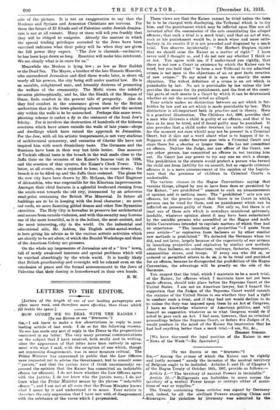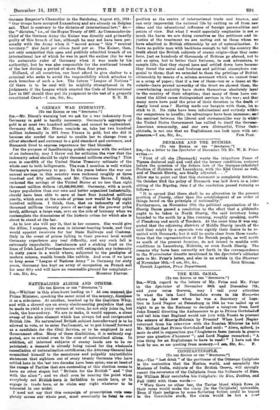[TO THE EDITOR OF THE " SPECTLTOR."1
Sin,—" Among the crimes of which the Kaiser can be rightly and justly accused" surely the invasion of the neutral territory of Belgium ought to be included. Articles I. and II. of Chapter 1 of the Hague Treaty of October 18th, 1907, provide as follows:— Article I.—" The territory of neutral Powers is inviolable."
Article II.—" Belligerents are forbidden to move aeroes the territory of a neutral Power troops or convoys either of muni- tions of war or supplies."
The Treaty containing them articles was signed by Germany and, indeed, by all the civilized Powers excepting China and "icaragua. Its ytolation by Germany was admitted by the
German Emperor's Chancellor in the Reichstag, August 4th, 1914: "Our troops have occupied Luxemburg and are already on Belgian soil. That is contrary to the dictates of international law," &o.— the "dictates," i.e., of the Hague Treaty of 1907. As Commander-in- Chief of the German Army the Kaiser was directly and primarily guilty of this breach of law, although he may not have been per- sonally with the Army when it "moved across" this "neutral territory." Qui facit per cilium facit per se. The Kaiser, then, not only committed this open and publicly admitted breach of an international law of which he was in part the author (for he was the autocratic ruler of Germany when it was made by his authority), but he was also responsible for the continued breach of the law during a period of more than four years.
Holland, of all countries, can least afford to give shelter to a criminal who seeks to avoid the responsibility which attaches to such breaches of such a law. The future "League of Nations" (if there is to be one) will be mightily strengthened in its judgments if the League which enacted the Code of International Law in 1907 should thus put its judgment to the test of a properly constituted Court.—I am, Sir, &o., S. R. H.







































 Previous page
Previous page